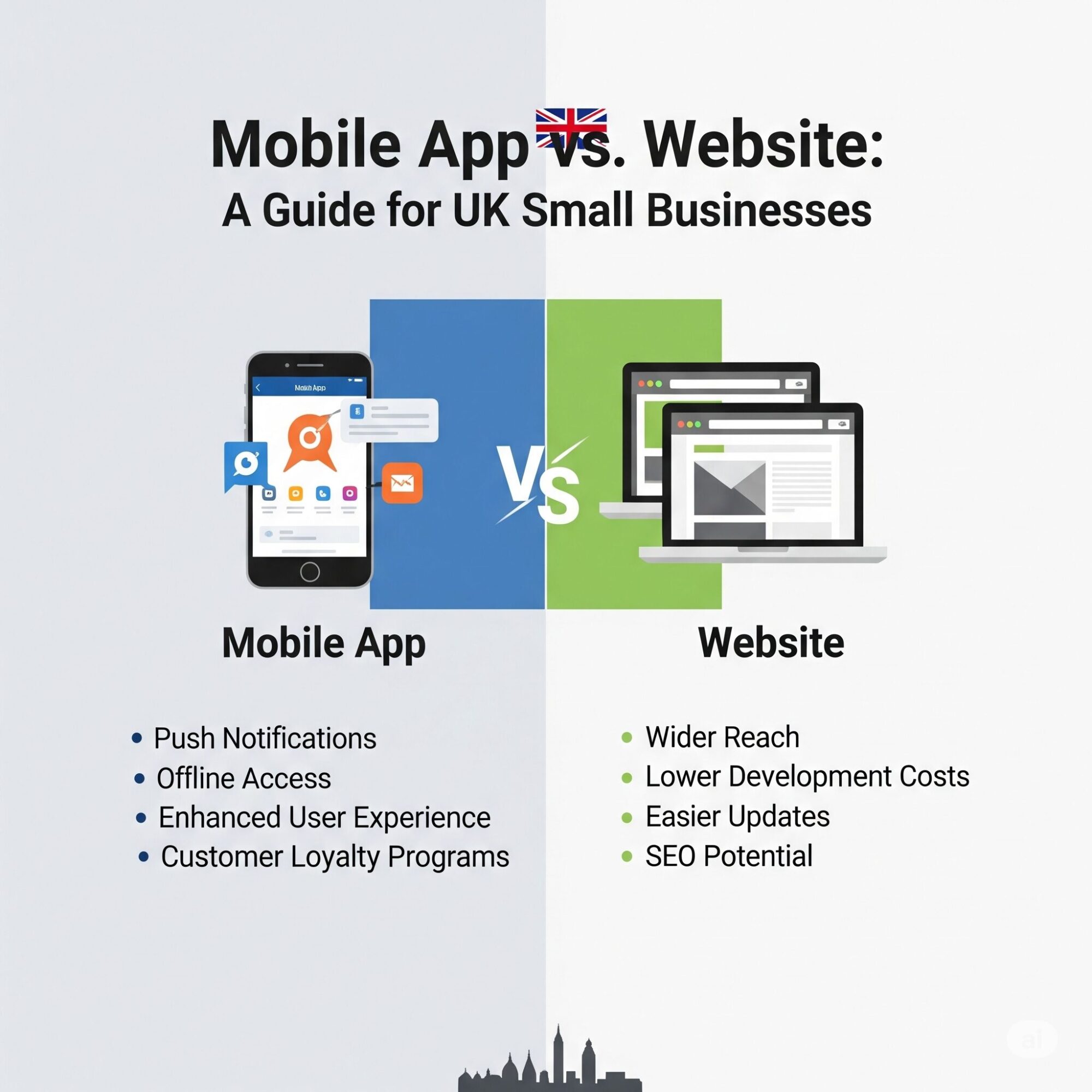In today’s digital-first world, UK small businesses are under increasing pressure to build a strong online presence. Whether it’s a corner shop in Manchester or a boutique service provider in London, the question remains: should you invest in a mobile app or stick with a website? Understanding the pros and cons of each can help small businesses make informed, cost-effective decisions.
Understanding the Basics
Before diving into the pros and cons, it’s important to define what we’re comparing.
- Mobile App: A software application developed specifically to run on mobile devices like smartphones and tablets. Users download and install these apps from platforms like the App Store or Google Play.
- Website: An internet-based platform that users can access via web browsers on desktops, tablets, and mobile devices. Modern websites are often mobile-optimized and responsive.
Both platforms serve the purpose of reaching your audience, but they differ significantly in terms of cost, user engagement, and scalability.
Why Small Businesses in the UK Prefer Websites
For most UK startups and small businesses, launching with a website is the natural first step. Here’s why:
1. Lower Initial Cost
Building a website is generally less expensive than developing a mobile app. A basic, professional website can cost between £500 and £2,000, while a mobile app might start at £5,000 and go well beyond £50,000 depending on features.
2. Wider Accessibility
Websites are universally accessible on any device with a browser—no installation required. This makes them ideal for attracting new customers, especially those searching via Google or Bing.
3. SEO Benefits
A website can be optimized for search engines to attract organic traffic. With proper SEO techniques, your business can appear in local searches like “plumber near me” or “best bakery in Leeds,” driving consistent web traffic.
4. Easy Maintenance and Updates
Websites can be updated in real-time without requiring users to download anything. This is a significant advantage for businesses that regularly update their content or offerings.
When Mobile Apps Outshine Websites
While websites are a solid foundation, mobile apps are becoming increasingly popular—and for good reason.
1. Enhanced User Engagement
Apps provide a more personalized and interactive experience. With push notifications, in-app messages, and easy navigation, apps encourage more frequent engagement and brand loyalty.
2. Offline Functionality
Unlike websites, many mobile apps can function offline or with limited internet access, offering convenience for users on the go.
3. Faster Performance
Mobile apps are typically faster than mobile websites because they store data locally. This is critical for businesses where speed enhances the user experience, such as food delivery or e-commerce.
4. Brand Presence
Once installed, your app icon stays on the user’s device, serving as a constant reminder of your business. This brand presence is valuable for customer retention and repeat sales.
Which One is Right for Your Business?
Choosing between a mobile app and a website depends on your business model, audience, and goals.
Choose a Website If:
- You’re just starting out and have a limited budget.
- You rely heavily on search traffic and visibility.
- You need to provide detailed information about your products or services.
- Your goal is broad online reach with minimal maintenance.
Choose a Mobile App If:
- You already have a loyal customer base.
- You need to offer unique features like booking systems, user accounts, or in-app purchases.
- Customer retention and direct engagement are key goals.
- You’re in a competitive niche where user experience is a differentiator.
For many UK businesses, the ideal strategy combines both—a mobile-responsive website for discoverability and a mobile app for deep engagement.
The Hybrid Approach: Why Not Both?
As your business grows, you don’t have to choose one over the other. A well-optimized website can bring in new customers, while a mobile app can help retain them.
If you’re unsure where to start, consulting a professional mobile app development company can help you assess your current digital setup and recommend the best next step. Some companies even offer hybrid solutions that blend web and app functionality for maximum reach and efficiency.
Final Thoughts
For UK small businesses, digital success is no longer optional. Whether you go with a mobile app, a website, or both, the goal is to serve your customers better and grow your brand online. Evaluate your audience’s behavior, your business model, and your long-term goals.
And if you’re looking to take your customer experience to the next level, investing in quality mobile app development could be the competitive edge your business needs.



